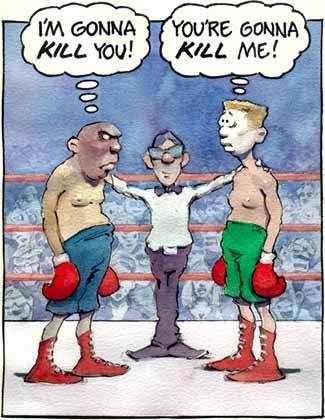Dr. Randy Borum

Lots of people have said that combat sports and other high-level competitive activities are 10% physical and 90% mental. That's probably exaggerated, and of course there is no real way to measure the relative importance, but it does suggest - at least - that your mental condition and performance are critical elements of your game.
Research conducted with Olympic and other elite athletes shows that mental or psychological factors become more important as you reach higher levels of competition. Most athletes spend much more time on physical training than on mental training, but physical conditioning usually peaks out before mental conditioning. So improving psychological skills will probably yield greater benefits for professional and amateur fighters than for those who train just for fun and fitness.
Sport psychology applies psychological methods and principles to improve sport performance. It won't magically transform a bad fighter into a great one. Its fundamental purpose is to help athletes achieve their potential. That task may require removing (or treating) psychological barriers, building psychological skills, or a combination of both. If a fighter has some psychological disorder – like depression – which is interfering with his life and competitive performance, that condition obviously should be treated. This, however, is probably the narrowest and most infrequent application of sport psychology. Most interventions are designed to address some sport-specific problem like fight night anxiety or to enhance performance.
What fighters should understand about sport psychology is that there are many interventions that have been proven in research and in the ring, but that they rarely come in the form of a "quick fix." You might perfectly demonstrate and explain a "flying armbar" to a novice grappler, but you probably would not expect him or her to execute it flawlessly after one lesson. Fighters seem to understand that physical skills require practice, but seem often to assume that psychological skills like concentration, managing arousal levels, and mental toughness should come naturally – or even that they can't be learned. Not true. They can be learned, but mastering them requires practice.
At the most basic level, there are three components of your fight performance that are affected by psychological factors – you can improve all of them: Thoughts (Cognition); Feelings (Emotion) and Physical (Somatic). Each of these affects the other in different orders at different times. A random thought like "What happens if I lose? My family and students are here. I'll be letting them down and I'll be humiliated" can almost immediately cause feelings of nervousness and anxiety, which then produce physical sensations like shaking, rapid heart beat, hyperventilation or nausea. But that's not the end of the cycle. Your mind interprets those physical symptoms as signs that your body is in danger or trouble. You begin to think: "Oh sh**, I'm going to die…or at least throw up in front of God and everybody – then die of humiliation." This, of course makes you more anxious, which makes your body react more until you've spiraled down to get yourself in a pretty bad state.
It doesn't have to start with a thought either. It may begin with some feeling – maybe a lack of confidence – or a physical sensation, like "butterflies," but if left unchecked, the cycle can easily take on a life of its own, controlling how you perform. The solution – just like fight strategy – lies in preparing for what might happen and building a skill set to respond effectively. Sport psychology interventions help fighters develop competition-related control over their thoughts, feelings, and their bodies. In a match, you will know how to direct those processes, rather than just react to them. A good fighter would never walk into the ring or cage, not having trained and just thinking "I'll see if he attacks and if, so I'll just try to counter somehow. I'll worry about that if it happens." A good fighter prepares rigorously, develops plans for as many scenarios as possible, and develops the necessary skills to execute those plans before stepping in to fight. Psychological skills require no less preparation and deserve no less attention than other aspects of conditioning.
How do we prepare to "get in front of" the problem? One approach is what I call the "theory of mutually incompatible responses." There's probably a better name for it. I'll work on that and I'll discuss the basic principle in the next post.

1 comment:
I'm a combat instructor, and particularly in weapons combat, I train my strategists in understanding the concept of the "simultaneous game theory," found in the study of "game theory."
Game theory is often utilized in economic and finance, but obviously, also in war.
This applies directly to your query -
"How do we prepare to "get in front of" the problem? One approach is what I call the "theory of mutually incompatible responses."
This "theory of mutually incompatible responses" is the essence of the "simultaneous game," in which two players are moving simultaneously toward an objective, neither knowing having foreknowledge of the other's move.
Now in warfare, you obviously don't want to leave things to chance - in other words, you want to have an advantage. A simultaneous game means that your enemy has just as much a chance to win as you, and that's bad news.
This is why the development of a "dominant strategy" is necessary. The awesomeness of military strategy is that no matter what the situation is, you need to take on the strategy that allows for the highest probability for success - if that means to retreat, then retreat and pull the enemy into a kill zone. If that means to assault the enemy with everything you've got, then you do it.
But like you stated, in order for a fighter to even begin to take advantage of strategies, they need to develop a broad set of skills (and have the conditioning to pull them off).
Post a Comment